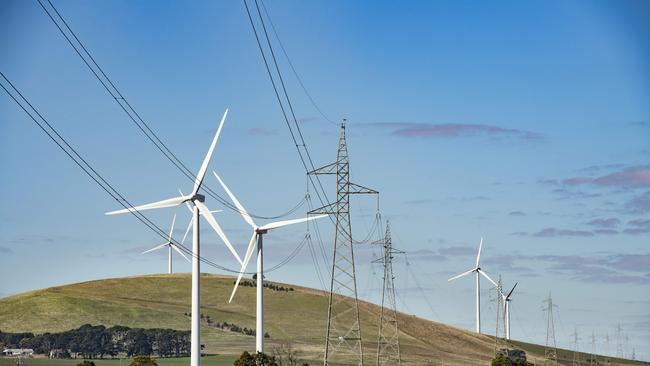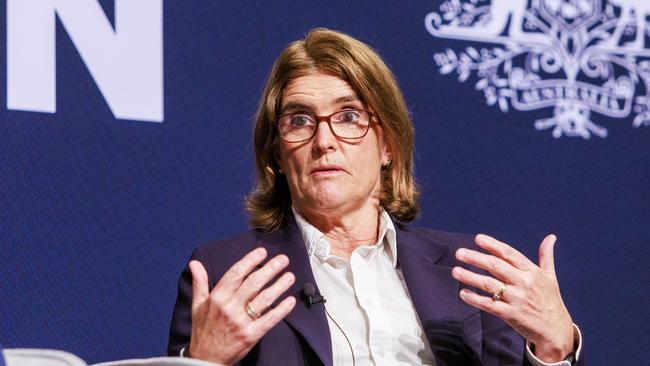Australia’s inflation falls to two-year low of 4.1pc as price pressures ease
Inflation fell faster than expected in the December quarter to its lowest level in two years, fuelling confidence the Reserve Bank will begin to cut interest rates in a matter of months.
Inflation fell faster than expected in the December quarter to its lowest level in two years as easing supermarket and fuel prices fuel market confidence that the Reserve Bank will begin to cut interest rates in a matter of months.
Economists say that inflation is also being driven down artificially by government subsidies and rebates, with the risk of a spike looming if those measures designed to ease cost of living pressures end.
Data from the Australian Bureau of Statistics showed that the Consumer Price Index indicator rose 4.1 per cent in the 12 months to December compared to 5.4 per cent in the September quarter.
The result was lower than the 4.3 per cent markets had expected, and down from the peak of 7.8 per cent in December 2022. It was also the lowest reading since 3.5 per cent in the 2021 December quarter.
Financial markets are certain the RBA will hold the cash rate at 4.35 per cent when it meets next week, and that further inroads into inflation and a slowing economy will pave the way for interest rate cuts in the second half of this year. Money markets have priced in two 25 basis point cuts in 2024 — the first in August and another in November.
This will be relief to households who have seen mortgage repayments soar by an extra $1210 each month on a typical $500,000 loan since the RBA started to lift rates in May 2022, and $2420 per month on a $1m loan, according to RateCity.com.au.
KPMG chief economist Dr Brendan Rynne said that services inflation, which has been cited as a major concern to the RBA, also softened considerably and the bank’s preferred measure of core inflation — trimmed mean — fell from 5.1 per cent to 4.25 per cent in the quarter.
“With both headline and core inflation falling briskly, combined with clear signs of slowdown in the economy, KPMG maintains our expectation that the tightening cycle has reached its top,” he said.

“Inflation remains too far outside of the target band for the RBA to start easing monetary policy at this stage. But (Wednesday’s) data confirms our view that two rate cuts are on the table for 2024 — most likely one in the third quarter and one in the fourth quarter.”
Consumer prices over the December quarter lifted 0.6 per cent against 1.2 per cent in the September quarter, while inflation slowed to 3.4 per cent in the year to December compared to 4.3 per cent in November.
The ABS noted that rent rose 0.9 per cent in the quarter — the smallest quarterly rise since the June 2022 quarter — but would have increased by 2.2 per cent without the government’s rental assistance package.
It added that the introduction of the Energy Bill Relief Fund rebates from July moderated the increase in electricity bills for households to 5.7 per cent since the June quarter compared to 17.6 per cent without the measures.
UBS chief economist George Tharenou said there was now risk of an inflation spike if subsidies and rebates (across both the Australian and state governments) which have materially lowered measured inflation were ended.
“If all these subsidies expire, there would be a large ‘technical’ increase in measured inflation over the coming year. However, it now seems increasingly likely that there will be an extension of at least some of these ‘cost of living’ support measures,” he said.
“The impact of lowering the inflation outlook is muted, because the extra cash available to households from the subsidies can, at the margin, support consumer demand (and hence inflation pressure) in other areas of spending.”
Helping to drive inflation lower over the December quarter was automotive fuel, which fell 0.2 per cent in the quarter to an annual growth of 5.4 per cent in the year. The cost of furniture was down 4.3 per cent in the period amid heavy discounting during the Black Friday sales.

Food and non-alcoholic beverage prices increased 0.5 per cent in the quarter — the smallest rise since September 2021 as meat and seafood prices fell 1.2 per cent and fruit and vegetables prices slid 1.2 per cent. It comes after Anthony Albanese appointed former Labor minister Craig Emerson earlier this month to lead an inquiry into supermarket prices.
Tobacco was among the biggest rises, up 7 per cent in the quarter, following the introduction of the 5 per cent annual tobacco excise indexation. Insurance had a strong quarterly movement of 3.8 per cent, following the 2.8 per cent rise in September 2023 quarter.
The faster than expected fall to inflation comes after retail turnover in December fell 2.7 per cent — the sharpest decline since the Covid-19 lockdowns in 2020 as cost of living pressures forced many to adjust purchasing to around big sales events such as Black Friday.
The RBA, led by governor Michele Bullock, wants to return inflation to within 2-3 per cent and had warned that it would lift rates again if levels were sticky and not falling as fast as anticipated. Its Statement on Monetary Policy published in November forecasted inflation would drop to 4.5 per cent by December 2023 and hit the top end of the target in December 2025.
The International Monetary Fund forecasted on Tuesday that Australia’s economy is expected to expand by 1.4 per cent this year, a 0.2 percentage points increase on its previous annual forecast. At the same time, inflation is projected to ease across advanced economies, including Australia, falling to an average of 2.6 per cent in 2024.






To join the conversation, please log in. Don't have an account? Register
Join the conversation, you are commenting as Logout